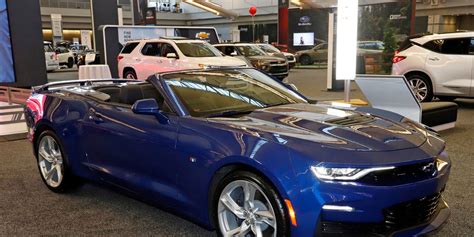The Camaro is a highly coveted muscle car that has a loyal fanbase. With its stylish looks and powerful engines, it’s become an icon in the automotive world. But the question on everyone’s mind is when will they stop making the Camaro?
The answer to that question is a bit complicated. Although the Camaro has been in production since 1966, it has gone through several iterations. The current sixth-generation Camaro was introduced in 2016 and will be in production until 2023. After that, it’s unclear if Chevrolet will keep producing the Camaro or if they will move on to a new model.
Chevrolet has not officially announced what will happen to the Camaro after 2023, but there are some rumors floating around. One rumor is that the seventh-generation Camaro may be the last one ever produced. Another rumor is that the Camaro may be replaced by an all-electric model.
Of course, the future of the Camaro is up in the air, but there is still plenty of time to enjoy the current sixth-generation Camaro. It’s powered by either a V6 or a V8 engine and is available in a variety of trim levels. The SS trim is the most powerful option and comes with a 6.2L V8 engine that produces 455 horsepower. Prices for the Camaro start at around $25,000.
So, while the future of the Camaro is uncertain, Chevrolet is still producing the current model until at least 2023. After that, only time will tell what happens to this iconic car.
The Last Year Of The Iconic Chevrolet Camaro
The Chevrolet Camaro has been a classic car for American drivers since the 1960s and it has been an iconic vehicle for car enthusiasts. Now, after over 50 years of production, the last year of the Camaro is about to come to a close.
The final model year for the Camaro is 2019 and the last car off the Assembly Line will be produced in August 2019. Chevrolet has announced that the 2019 Camaro will include a number of updates and improvements, including a new 10-speed automatic transmission, improved fuel economy, and a revised exterior design.
The 2019 Camaro is available in coupe and convertible body styles with a choice of either a 2.0L turbocharged four-cylinder engine, a 3.6L V6, or a 6.2L V8. The base model has a starting price of $25,995 while the top of the line Camaro SS starts at $39,995.
The 2019 Camaro is loaded with features, including a standard rearview camera, automatic climate control, Apple CarPlay and Android Auto compatibility, and modern safety technologies such as forward collision warning, lane keep assist, and lane departure warnings.
The 2019 Chevrolet Camaro is the perfect way to end the iconic car’s long production run. It’s a fitting tribute to the car that has been a favorite of car enthusiasts for over 50 years and it’s sure to be a sought-after collector’s item for years to come.
The 2019 Chevrolet Camaro is the last of its kind and it’s sure to be a beloved classic for generations to come.
| Model | Engine | Starting Price |
|---|---|---|
| Camaro | 2.0L Turbocharged Four-Cylinder | $25,995 |
| Camaro LT | 3.6L V6 | $27,995 |
| Camaro SS | 6.2L V8 | $39,995 |
The 2019 Chevrolet Camaro is the perfect way to honor the legacy of this iconic car. If you’re looking for a classic car that will stand the test of time, then the 2019 Camaro is the perfect choice.
When Will Chevrolet Discontinue The Camaro?
Chevrolet has been producing the iconic Camaro for nearly 50 years. While rumors have been swirling for years about when Chevrolet will discontinue the Camaro, it is unclear when that will finally happen. The Camaro was first introduced in 1966, and has since become an iconic symbol of performance and style.
The latest word from Chevrolet is that the Camaro will continue to be produced until at least 2024. This means that it will have been in production for 58 years when it is finally discontinued. This is an impressive feat, and goes to show just how popular the Camaro is with car enthusiasts around the world.
In terms of features, the Camaro still offers plenty of bang for your buck. It has a powerful V8 engine that provides plenty of power and performance, as well as modern features such as a touchscreen infotainment system and wireless charging pad. Prices for the Camaro range from around $25,000 for the base model, up to more than $50,000 for the ZL1.
While the future of the Camaro is uncertain, it seems likely that Chevrolet will continue to produce the car until at least 2024. After that, the fate of the iconic vehicle is unknown. Until then, car enthusiasts will be able to enjoy the Camaro’s performance and style for years to come.
No specific year has been set, as the production of the Camaro is ongoing.
No, the Camaro is still in production.
Yes, the Camaro is an iconic model that is likely to continue to be in production for years to come.
It is unknown what the future holds for the Camaro production, as no specific year has been set for discontinuation.
No, there is no set year that production of the Camaro will cease.
Yes, Chevrolet is committed to continuing the production of the Camaro.
No, there is no planned end date for Camaro production.
Yes, new and updated versions of the Camaro are likely to be released in the future.
Yes, ongoing production of the Camaro means that new models are likely to be released in the future.
No specific time has been set for the discontinuation of the Camaro.






